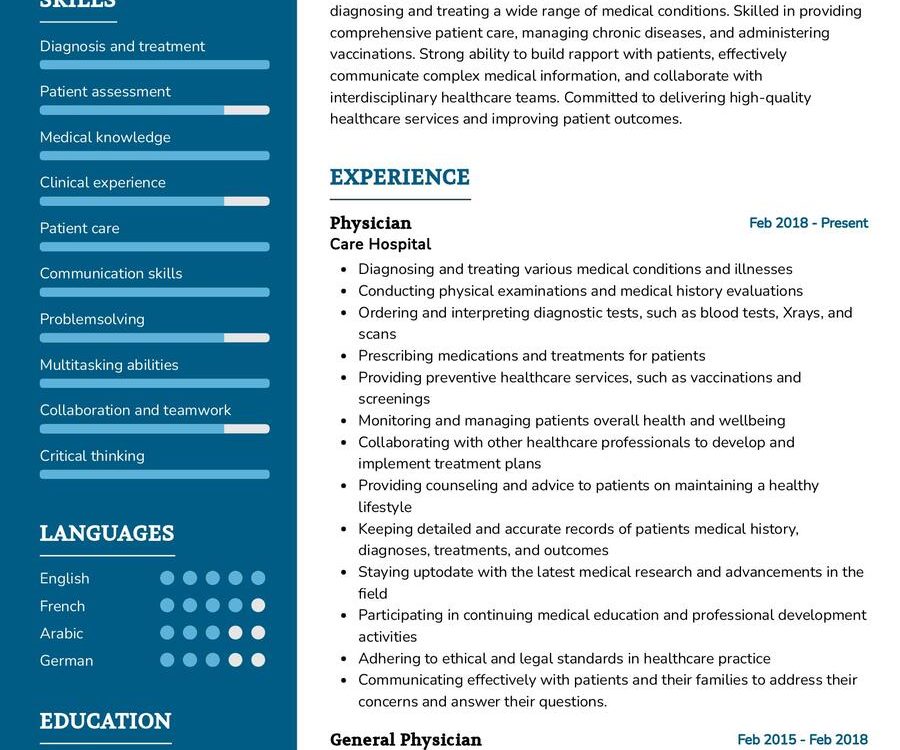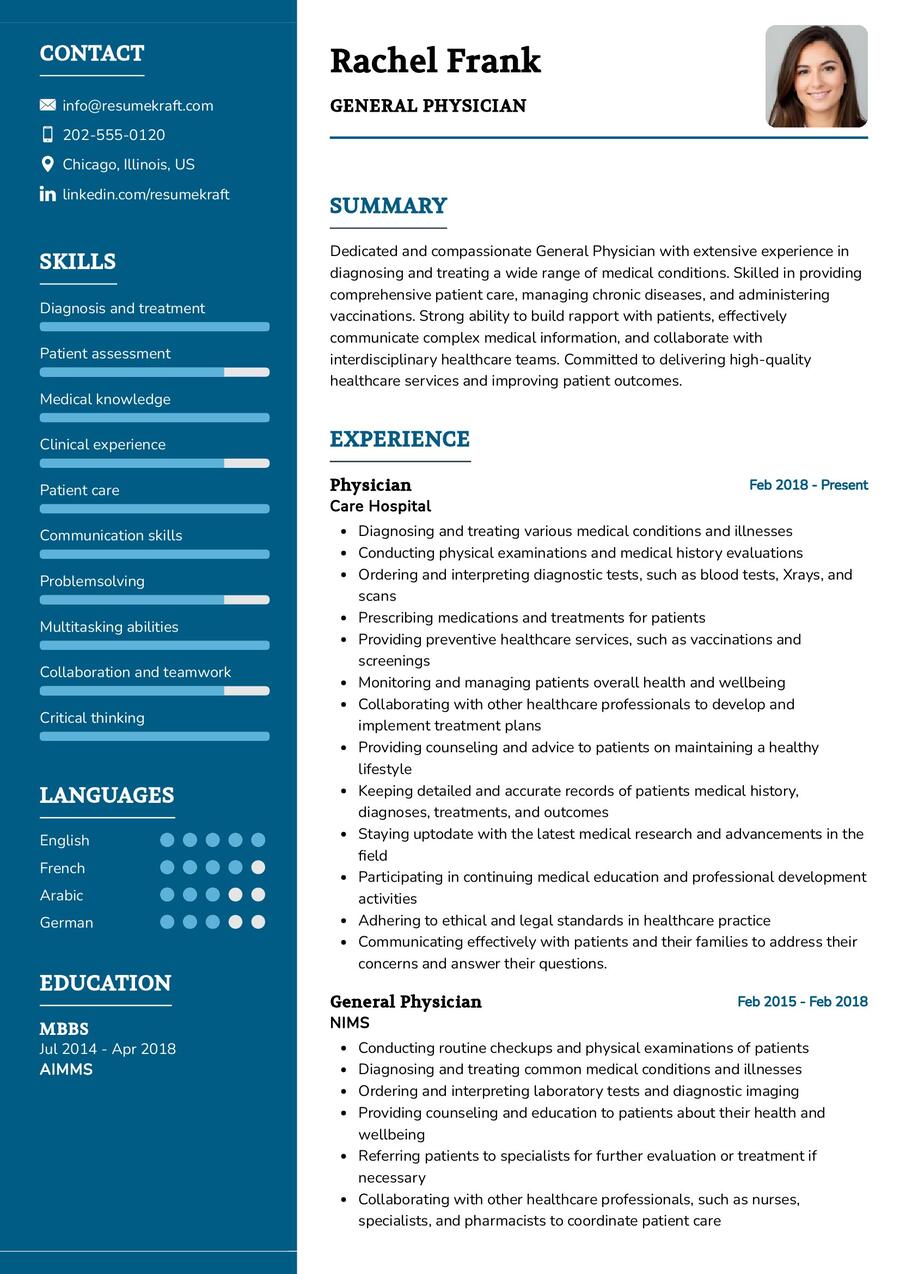Exploring the Role of a General Physician
As the healthcare landscape continues to evolve, the role of a General Physician remains crucial in providing primary medical care to individuals across diverse communities. This article delves into the multifaceted responsibilities, educational requirements, and skills needed to excel as a General Physician.
Job Requirements for a General Physician
Becoming a General Physician involves meeting specific requirements to ensure you are well-equipped to handle the challenges of primary care. Let’s explore the prerequisites necessary for embracing the role of a General Physician:
- A Medical Doctor (MD) or Doctor of Osteopathic Medicine (DO) degree from an accredited institution, showcasing a solid foundation in medical sciences.
- Completion of a residency program in family medicine or internal medicine, demonstrating hands-on experience in patient care.
- Strong diagnostic and analytical skills, honed through clinical experience and ongoing medical education.
- Excellent communication and interpersonal skills, crucial for building rapport with patients and collaborating with healthcare teams.
- Adaptability and resilience, the ability to thrive in a fast-paced healthcare environment.
- Proficiency in electronic health record (EHR) systems, ensuring accurate and efficient documentation of patient information.
Continued professional development through certifications and staying updated with medical advancements further enhances your profile as a General Physician.
Responsibilities of a General Physician
The role of a General Physician is a blend of medical expertise, compassion, and effective communication. Let’s delve into the key responsibilities that define this vital role:
- Conducting comprehensive medical examinations, diagnosing and treating a wide range of health conditions.
- Providing preventive care, including vaccinations, screenings, and health education to promote overall well-being.
- Managing chronic illnesses, creating tailored treatment plans to enhance patients’ quality of life.
- Collaborating with specialists and other healthcare professionals to ensure holistic patient care.
- Responding to medical emergencies, making critical decisions to stabilize patients before referral to specialized care.
- Building lasting relationships with patients, fostering trust and open communication.
Each responsibility requires a combination of medical knowledge, empathy, and a patient-centered approach.
Crafting an Impressive General Physician Resume
Your resume is a powerful tool to showcase your skills and experiences. Here are some tips to create a compelling General Physician resume:
- Highlight your patient care experiences, emphasizing positive outcomes and patient testimonials.
- Showcase your commitment to ongoing education, listing relevant certifications and participation in medical conferences.
- Include metrics to quantify your impact, such as the number of patients treated or successful treatment outcomes.
- Personalize your resume for each application, aligning your skills with the specific requirements of the job.
Your resume is a reflection of your dedication to healthcare and your ability to make a positive impact on patients’ lives.
General Physician Resume Summary Examples
Your resume summary is the gateway to your professional journey. Here are examples to inspire you:
- “Dedicated General Physician with a decade of experience, passionate about delivering high-quality patient-centered care.”
- “Compassionate MD with expertise in preventive medicine and a track record of improving patient outcomes.”
- “Detail-oriented General Physician committed to continuous learning and embracing innovative healthcare practices.”
Your summary sets the tone for your resume, capturing the essence of your medical expertise and commitment to patient well-being.
Building a Strong Experience Section
Your experience section narrates your journey in healthcare. Here are examples to guide you:
- “Led a primary care team, achieving a 15% improvement in patient satisfaction through personalized care plans.”
- “Established a community health program, addressing preventive care needs and reducing emergency room visits by 20%.”
- “Collaborated with specialists in managing complex cases, ensuring comprehensive and coordinated patient care.”
Each experience is a chapter in your medical career, showcasing your impact and contributions to healthcare.
Educational Milestones for a General Physician
Your educational journey is the foundation of your medical career. Here’s how you can list your milestones:
- Doctor of Medicine (MD), XYZ Medical School, a testament to your rigorous medical education, 2012.
- Residency in Family Medicine, ABC Hospital, a hands-on training ground for primary care, 2015.
- Board Certified in Family Medicine, showcasing your commitment to excellence in patient care, 2018.
Each educational qualification represents a milestone in your journey towards becoming a skilled General Physician.
Skills Essential for a General Physician
Your skill set is your toolkit in providing excellent patient care. Let’s list down the essential skills for a General Physician:
Soft Skills:
- Compassion and empathy, essential for understanding and addressing patients’ concerns.
- Communication skills, fostering effective dialogue with patients and healthcare teams.
- Problem-solving abilities, crucial in diagnosing and treating a variety of medical conditions.
- Attention to detail, ensuring accurate medical documentation and diagnosis.
- Adaptability and resilience, navigating challenges in the ever-evolving healthcare landscape.
Hard Skills:
- Proficiency in electronic health record (EHR) systems, streamlining patient information management.
- Diagnostic skills, accurately identifying and treating a wide range of medical conditions.
- Preventive care knowledge, promoting wellness through vaccinations and screenings.
- Collaboration with healthcare teams, ensuring comprehensive patient care.
- Emergency medicine skills, responding swiftly to medical emergencies.
Each skill equips you to provide exceptional patient care and navigate the complexities of healthcare.
Common Mistakes to Avoid in a General Physician Resume
As you craft your resume, avoid common pitfalls that may hinder your chances. Here are some mistakes to steer clear of:
- Avoid using generic language; tailor your resume to highlight your unique skills and experiences.
- Focus on achievements rather than just listing job duties, providing depth to your narrative.
- Don’t underestimate the importance of a cover letter; use it as an opportunity to connect personally with potential employers.
- Ensure your resume is accessible to all readers by avoiding excessive medical jargon.
- Proofread meticulously to maintain a professional image.
Avoiding these mistakes ensures your resume is authentic and compelling, increasing your chances of standing out in the competitive job market.
Key Takeaways for Your General Physician Resume
As we conclude this comprehensive guide, let’s recap the key points to consider when crafting your General Physician resume:
- Emphasize your commitment to patient-centered care and positive outcomes.
- Showcase your continuous learning journey and engagement in medical advancements.
- Quantify your impact with metrics, demonstrating the tangible results of your efforts.
- Customize your resume for each application, aligning your skills with specific job requirements.
Finally, feel free to utilize resources like AI Resume Builder, Resume Design, Resume Samples, Resume Examples, Resume Skills, Resume Help, Resume Synonyms, and Job Responsibilities to create a standout application and prepare for the General Physician job interview.
Armed with these insights and tips, you are now ready to craft a resume that reflects your dedication to healthcare and positions you as a valuable General Physician. Best of luck!


